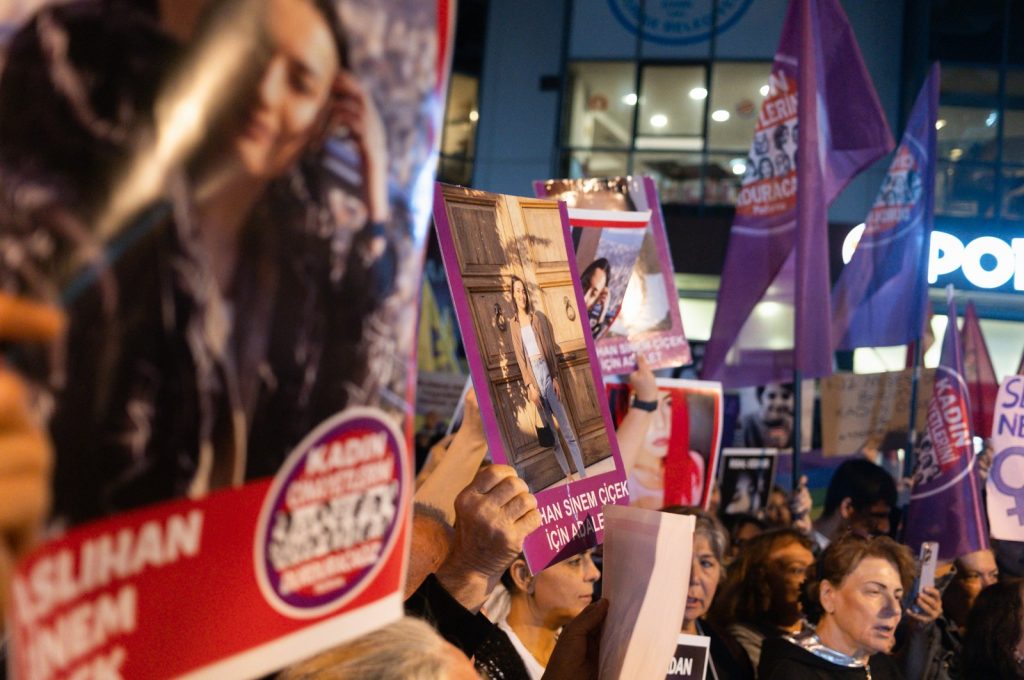The term “social decay” fell like a bombshell into Türkiye’s agenda at the end of 2023 during a coincidental street interview that started discussing the country’s economic situation and became viral once the interview was posted on YouTube.
A woman was asked whether she could get by with her salary and answered: “There is social decay currently in Türkiye. The economy gets better with time as exampled by world history but social decay is much more difficult to fix.” The lady speaking was a sociologist, Zeliha Burtek, emphasizing the gradual loss of ethics caused by “global factors as well as internal ones such as topics increasingly treated in certain TV series.”
As Türkiye is on one side following the intense developments in the region, including the fight against terrorism and politics, another fiercely debated issue is increasing crime that mostly targets children and women.
The murder of an 8-year-old girl on Aug. 21 by her close relatives horrified the nation and triggered protests. The girl, Narin Güran, had gone missing for weeks before her body was found in a sack hidden under rocks in a case in a village near southeastern Diyarbakir. In September, a female police officer named Şeyda Yılmaz was killed in Istanbul by a man who already had a record of 19 crimes but was freely walking among the public. Again in Istanbul, earlier this month, two 19-year-old women were brutally murdered by a man named Semih Çelik. The bodies were dismembered and openly displayed in daylight before Çelik committed suicide. Moreover, Rojin Kabaiş, a 21-year-old university student went missing last month before her body was found on the shores of Lake Van. The perpetrators could not yet be found.
Perception of impunity
The consecutive murders and femicides have raised concerns, especially among women. At least 403 women were killed in Türkiye last year, most of them by current or former spouses and other men close to them, according to the We Will Stop Femicides Platform, a group that tracks gender-related killings and provides support to victims of violence.
The main grievances among the public are allegations that courts are lenient toward male abusers who claim they were provoked, express remorse or show good behavior during trials. Restraining orders are seen as often too short and those who violate them are not detained, putting women at risk. This, along with a perception of impunity that has been spread both due to increasing social media posts and fear, has caused unrest.
Mahinur Özdemir Göktaş, the minister for family affairs, says she has made protecting women a priority and personally follows trials. Women in the country call for existing measures to be adequately enforced.
The issue was even touched upon by the president who said two weeks ago: “We cannot allow a perception of impunity. We will make legal arrangements that will address the problematic areas in terms of making punishments reformatory and deterrent.”
The ruling Justice and Development Party (AK Party) is preparing to make changes to the legal system to prevent crimes of femicide and child abuse. The amendment will be brought to the agenda of Parliament with the 10th Judiciary Package.
President Recep Tayyip Erdoğan announced that a new unit will be established in the Justice Ministry to monitor cases related to crimes against women and children.
On the other side, maybe the most shocking has been the revelation of a “newborn gang” that is accused of causing the deaths of several infants after placing newborns in intensive care units for financial gain. According to the ongoing investigation, the gang transferred infants to selected hospitals to receive higher funds from the country’s social security system with more expensive treatments.
Hospitals, which people visit when they are at their most vulnerable and need to trust, are currently being viewed with suspicion. Private hospitals’ efforts to extend the stay of patients to earn more money or propose unnecessary surgeries again with the aim of increasing gains have recently become common. The surfacing of the “newborn gang” has raised question marks as to how big the scope of fraud within hospitals in Türkiye is and whether the issue is limited to newborns or elders and patients in general. Following the gang becoming public, retrospective complaints have piled up with cases where babies were mistreated in hospitals.
Health Minister Kemal Memişoğlu last week described the issue as “uncovering a deeply rooted issue that requires immediate action.”
Memişoğlu pointed to a structural reform regarding private health institutions and updating the current inspection system.
“While we continue our current health services without allowing any disruption or abuse, our ministry’s inspection teams will be on the field at full capacity to inspect not only the newborn branch but all branches in the hospitals.”
In addition to updating the current regulation system, commissions consisting of specialist physicians and academics from each branch will be established.
The concerns of increasing crime are not unfounded but aggravated through social media. Reforms, regulations and increasing meticulousness in especially legal cases concerning women and children are necessary and on the way. Although Türkiye’s agenda is in a never-ending cycle, the public’s focus will continue to be on criminality and the legal system in the days to come.


